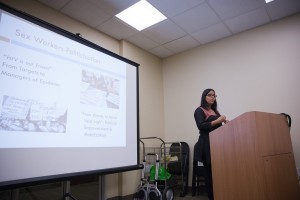Dornsife hosts dialogue on feminist issues in India
On Tuesday, the Dornsife College of Letters, Arts and Sciences hosted a “Feminist Conversation” in the Hall Building that covered gender and the paradox of transnational advocacy for sex workers and gay and lesbian people in India.
The event featured Chaitanya Lakkimsetti, an Andrew Mellon Postdoctoral Fellow with the gender studies program and the Center for Feminist Research at USC.

Globalized discrimination · Chaitanya Lakkimsetti, an Andrew Mellon Postdoctoral Fellow in Gender Studies & Center for Feminist Research, discusses the transnational approach to the sexuality of labor on Tuesday. – Ralf Cheung | Daily Trojan
Lakkimsetti specializes in areas concerning sociology of gender, sexualities, law and society, global sociology and qualitative research methods. Her doctoral dissertation, which won the Law and Society Association’s best dissertation award in 2011, compared the political struggles surrounding decriminalization of homosexuality with the legal and political struggles over sex work in India. Lakkimsetti is currently working on a book manuscript titled Governing Sexualities: Governmentality, Biopower and Citizenship in Postcolonial India.
Contemporary India is at an intersection of the postcolonial state, social movements and transnational advocacy, Lakkimsetti said. Speaking on the basis of her ethnographic research, Lakkimsetti discussed the role of globalization in shaping local struggles in the comparative case of anti-sodomy law and decriminalization of sex work.
“She provided a different perspective on things that you hear of all the time in the news [regarding these issues],” said Allison Miller, a postdoctoral scholar in the history department. “The discussion really pulled together different points of view — it was truly eye-opening.”
One of Lakkimsetti’s main assertions during the discussion was that globalization of health and human rights interact unevenly with Indian struggles, due to established transnational norms. She said that though globalization of Western ideologies of sexuality are viewed by some in a positive light as it liberates traditional sexualities, this globalization can also be viewed in a negative light because it intrudes on indigenous culture in a way that is not as beneficial as one would think.
Lakkimsetti also said transnational advocacy has focused on prostitution as a gendered issue, and not as sexual labor. Similarly, she said homosexuality is viewed as a matter of sexual identity, and not a matter of gender identity.
“[Dr. Lakkimsetti’s] discussion about the transnational approach to sexuality of labor represented one node of study that we’re really interested in pursuing in gender studies,” USC English professor Alice Echols said.
Throughout her talk, Lakkimsetti discussed the past and present movements in India led by sex workers, gay men and lesbians, and the results of these movements, some of which were very effective and progressive.
In March 2006, about 5,000 sex workers stormed the Indian parliament building to protest a controversial amendment regarding prostitution and trafficking laws. In another significant development, the New Delhi High Court made a landmark judgment on the anti-sodomy law in July of 2009.
Lakkimsetti spent much of her speech reviewing recent movements, bills and mobilizations in India that indicate progress for sex workers and homosexuals in gaining more of the rights that they have fought for.
“When people go back and think about this discussion, my goal is not for them to think about India as being completely repressive and backwards,” Lakkimsetti said. “My goal is that this discussion helps people to look at India as a country that actually has a lot to offer the world in the future.”
Follow us on Twitter @dailytrojan
